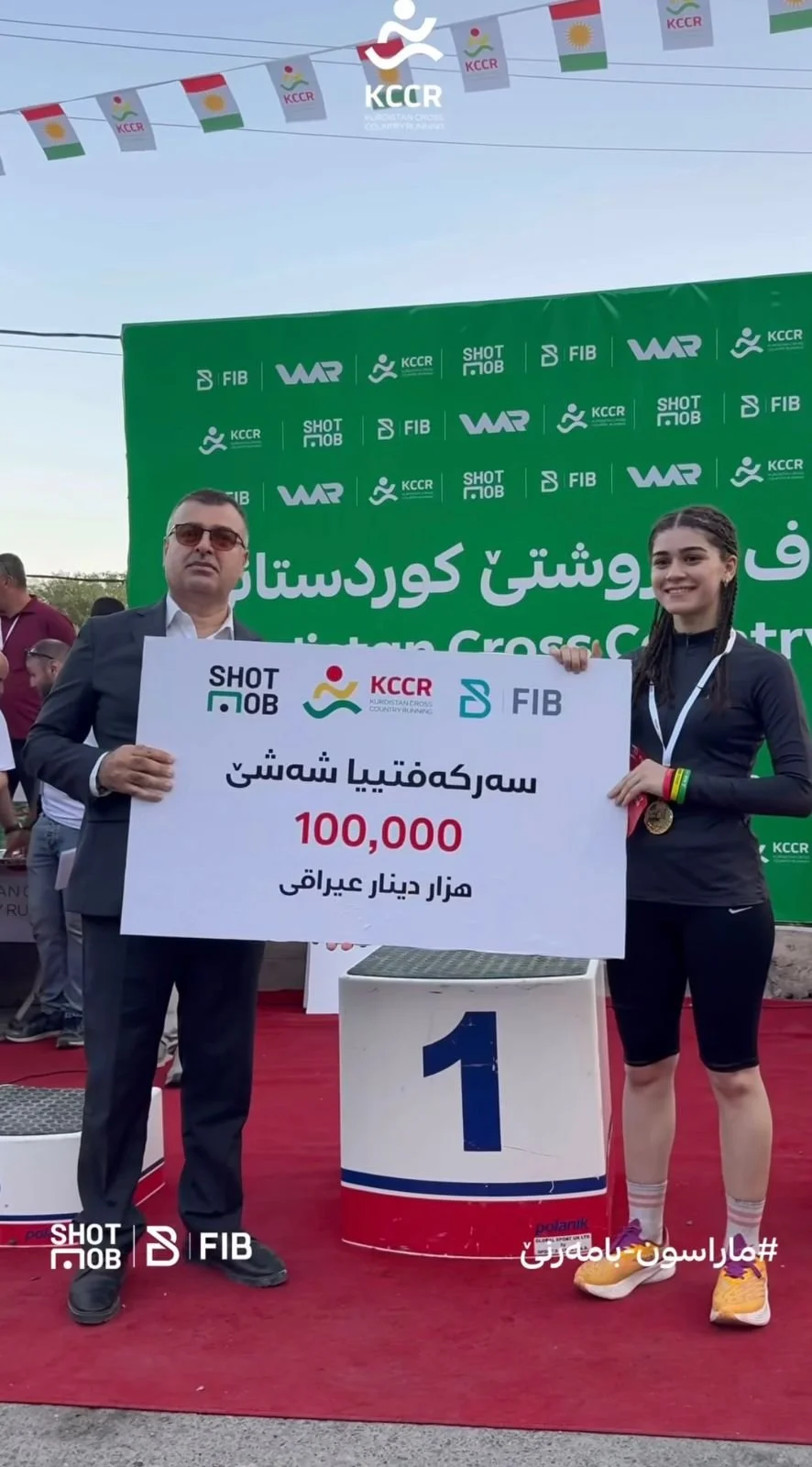KCCR 3km Race Report: Aryana
The post below is a race report from Aryana, a member of Free to Run Iraq who ran the 3km KCCR race in Iraq in August 2025.
I was constantly following their page from June, eagerly anticipating this new race in a new place. My coach, Batoul, focused on improving my speed for the terrain, and during my training, my pace was 3.5 min/km. I was incredibly excited to challenge myself and compete for first place. For two months, I had great training days, working on my pace and endurance.
However, all that changed just before the race when a bad flu hit, leaving me with a high temperature, a runny nose, and a headache for over a week. My body was weak and needed more time to recover, and I felt I couldn’t join. Still, I was determined to race alongside my siblings and achieve what I had been dreaming of.
Race day got off to a chaotic start. I woke up late at 7:30 a.m. and had a small breakfast of two eggs and a cucumber around 9:30. We were on the bus by 11:30, but it didn’t leave until 12:30.
At 2 p.m. I ate a banana on the bus, and we finally arrived at the race location at 3:30. It took another hour to get to the starting line and collect our numbers. After warming up, the race was postponed from 5 p.m. to 5:30 p.m., so we warmed up again. Just ten minutes before the start, I began to feel dizzy—likely from a lack of energy. My allergies flared up, making my nose run and my breathing difficult. The smoke in the air only made things worse, and my condition was clearly deteriorating.
I took a deep breath and started the race, immediately pushing a fast pace between 3:30 and 4min/km. My strategy was to get ahead early so I would have a buffer if something went wrong later. But as I reached the first ascent, my speed dropped. As soon as I finished it, the full weight of my recent illness hit me. My head and lower stomach ached intensely, as if someone were hitting me with a knife. I was forced to run while holding my stomach, a painful and difficult experience. The ascent itself was a major challenge, far more difficult and demanding than the course I had trained on in Erbil, even with my attempts to simulate it on a curved treadmill.
As I walked, three runners from the Free to Run team passed me, dropping me from fourth to eighth place. I kept running, but by the final kilometer, I was completely devastated. My body was screaming from fatigue, and I couldn’t get enough oxygen. The pain in my stomach was intense and unrelenting. I felt myself starting to give up, believing my condition would prevent me from achieving my goal of a top finish. Then I remembered all the hard work and training I had put in. Just then, I saw the coach of the girl who had placed second in a previous race we both ran. We had talked before the start of this race, and he knew my situation. When I told him I couldn’t go on, he immediately started running beside me, encouraging me. “No, no, complete the last 600 meters” he replied. His words powered up a new fire in me, and I started taking my biggest strides, seeing three girls still ahead of me.
Encouraged by these words and the atmosphere itself, I remembered my promise to myself: I am capable of being one of the best. I had to prove it. Ignoring the stabbing pain in my stomach, I ran with every ounce of strength I had left, managing to pass two of the girls ahead of me. With just 100 meters to the finish line, I poured all my remaining energy into a final burst of speed. There was nothing left to lose. I closed the gap, and the girl in seventh place and I were running shoulder to shoulder, each of us pushing for an inch of advantage. Seeing the finish line so close, I dug deep and found one last reserve of speed.
We reached the finish line together, but in the final second, I managed to pull ahead, securing sixth place. The moment I crossed the line, I fainted onto the ground. An older man from the organizing team immediately came over to spray water on my legs while someone else sprayed water on my face. I was then taken to the ambulance, where I sat crying from a mix of exhaustion and relief. They took me to the cold-water station, where I sat for five minutes, pouring water on myself until I started to feel a little better. Despite the pain and difficulties, I felt incredibly proud.
I had fought with myself, finished the race, and proven that I was strong enough to be among the top finishers. I wasn’t upset about not getting first place; on the contrary, I was thrilled that I had pushed through and succeeded.


